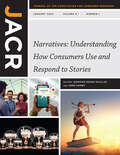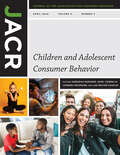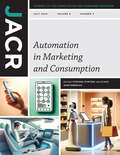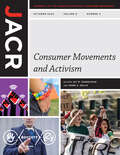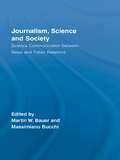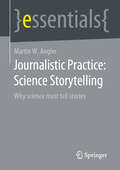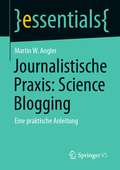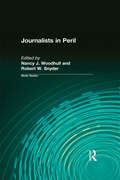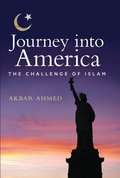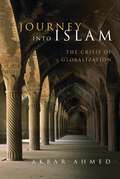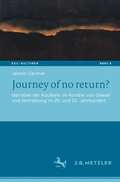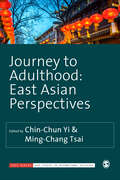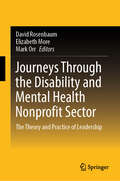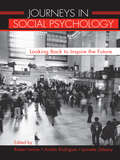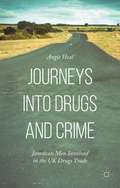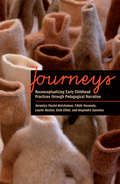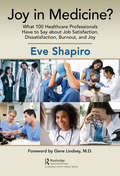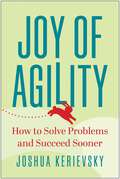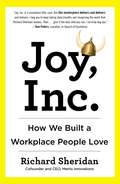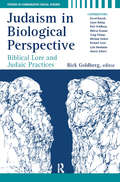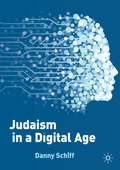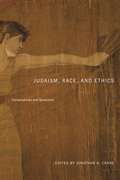- Table View
- List View
Journal of the Association for Consumer Research, volume 9 number 1 (January 2024)
by Journal of the Association for Consumer ResearchThis is volume 9 issue 1 of Journal of the Association for Consumer Research. The Journal of the Association for Consumer Research (JACR) publishes quarterly thematic issues exploring unique topics in consumer behavior. The mission of JACR is to broaden the intellectual scope and interdisciplinary influence of the Association for Consumer Research. Each issue of JACR has a well-defined theme, chosen from the broad substantive, managerial, and methodological topics relevant to understanding consumer behavior; and each issue is directed by a different team of editors who, with their relevant experience and expertise, are best poised to assemble outstanding articles around that theme.
Journal of the Association for Consumer Research, volume 9 number 2 (April 2024)
by Journal of the Association for Consumer ResearchThis is volume 9 issue 2 of Journal of the Association for Consumer Research. The Journal of the Association for Consumer Research (JACR) publishes quarterly thematic issues exploring unique topics in consumer behavior. The mission of JACR is to broaden the intellectual scope and interdisciplinary influence of the Association for Consumer Research. Each issue of JACR has a well-defined theme, chosen from the broad substantive, managerial, and methodological topics relevant to understanding consumer behavior; and each issue is directed by a different team of editors who, with their relevant experience and expertise, are best poised to assemble outstanding articles around that theme.
Journal of the Association for Consumer Research, volume 9 number 3 (July 2024)
by Journal of the Association for Consumer ResearchThis is volume 9 issue 3 of Journal of the Association for Consumer Research. The Journal of the Association for Consumer Research (JACR) publishes quarterly thematic issues exploring unique topics in consumer behavior. The mission of JACR is to broaden the intellectual scope and interdisciplinary influence of the Association for Consumer Research. Each issue of JACR has a well-defined theme, chosen from the broad substantive, managerial, and methodological topics relevant to understanding consumer behavior; and each issue is directed by a different team of editors who, with their relevant experience and expertise, are best poised to assemble outstanding articles around that theme.
Journal of the Association for Consumer Research, volume 9 number 4 (October 2024)
by Journal of the Association for Consumer ResearchThis is volume 9 issue 4 of Journal of the Association for Consumer Research. The Journal of the Association for Consumer Research (JACR) publishes quarterly thematic issues exploring unique topics in consumer behavior. The mission of JACR is to broaden the intellectual scope and interdisciplinary influence of the Association for Consumer Research. Each issue of JACR has a well-defined theme, chosen from the broad substantive, managerial, and methodological topics relevant to understanding consumer behavior; and each issue is directed by a different team of editors who, with their relevant experience and expertise, are best poised to assemble outstanding articles around that theme.
Journalism, Science and Society: Science Communication between News and Public Relations (Routledge Studies in Science, Technology and Society #Vol. 7)
by Massimiano Bucchi Martin W. BauerAnalyzing the role of journalists in science communication, this book presents a perspective on how this is going to evolve in the twenty-first century. The book takes three distinct perspectives on this interesting subject. Firstly, science journalists reflect on their ‘operating rules’ (science news values and news making routines). Secondly, a brief history of science journalism puts things into context, characterising the changing output of science writing in newspapers over time. Finally, the book invites several international journalists or communication scholars to comment on these observations thereby opening the global perspective. This unique project will interest a range of readers including science communication students, media studies scholars, professionals working in science communication and journalists.
Journalistic Practice: Why science must tell stories (essentials)
by Martin W. AnglerScience needs to tell good stories to combat fake news and to communicate complex issues. To do this, there are proven techniques, structures, recurring patterns, and elements that no good story should be without. This essential shows why we are wired to respond to stories, how they affect our brains, and what techniques we can use to convey them to every kind of audience, from funders to toddlers.
Journalistische Praxis: Eine praktische Anleitung (essentials)
by Martin W. AnglerKein Medium kann Wissenschaft so schnell der Öffentlichkeit vermitteln wie das Web. Blogs spielen dabei eine maßgebliche Rolle, weil sie in puncto Substanz genau zwischen hochkomplexen Papers und sehr vereinfachten Social Media-Beiträgen liegen. Dieses Buch zeigt, wieso Wissenschaftler diese Art des Publizierens in ihre Forschungsarbeit integrieren sollten. Es gibt praktische Ratschläge darüber, wie Blogs geplant werden müssen, wie sich Blogposts strukturieren lassen, welche geschriebenen Formate am effektivsten zur Wissenschaftskommunikation funktionieren und wie die Beiträge so geplant und publiziert werden können, dass sie ihr Publikum erreichen.
Journalists in Peril
by Robert W. Snyder Nancy J. WoodhullThreats to journalists carry many different lessons, but one is constant: People who would intimidate or kill journalists are usually terrified that someone might find out. Journalists who want to protect one another need do nothing more than what should come naturally to them: report on threats to journalists--big threats and small threats, whether they are directed against the international luminaries of the profession or small timers. Non-journalists can also play a big part in the fight to protect journalists. Next to tough and timely reporting that establishes the facts of a case, nothing protects a journalist so much as public outrage and public support. Ordinary citizens can play an enormous role by pressuring thugs and tyrants who would like to stifle the freedom of the press. The freedom of journalists is consequently the bedrock of freedom for all people. Chapters and contributors to 'Journalists in Peril' include: "The Clash of Arms in Exotic Locales" by Peter Arnett; "Press Freedom--Balkan Style" by Kati Marton; "Grim Prospects for Hong Kong" by John Schidlovsky; "Russian Reporters--Between a Hammer and an Anvil" by losif M. Dzyaloshinsky; "Defiant Publishing in Nigeria" by Dapo Olorunyomi; "Turkish Journalists on Trial" by Ahmet Emin; "In America, Justice for Some" by Ana Arana; and "Blood and Fear in Italy" by Candida Curzi. The tragic accounts detailed in 'Journalists in Peril' are poignantly written and are important reading for all concerned with democracy in the world, especially political scientists, government officials, and those involved in the various communications professions.
Journey into America: The Challenge of Islam
by Akbar AhmedFollowing up on his 2007 work, Journey into Islam: The Crisis of Globalization, in which he traveled the Islamic world with a team of researchers to investigate the diversity of Muslim societies abroad, Ahmed (Islamic studies, American U. in Washington, D. C.) here reports on a similar project in which he traveled through Muslim communities across the United States administering questionnaires and conducting interviews in order to explore social patterns and attitudes of American Muslims in the context of the broader history of American racial and religious relations. He begins with an ethnographic discussion of American identity in general before turning to an examination of the ethnography of Islam in America, within which he offers separate discussions of African American Muslims, Muslim immigrants, and white and Latino Muslim converts. He also includes chapters comparing the American experiences of Muslims to that of Jews and Mormons. Annotation ©2010 Book News, Inc., Portland, OR (booknews.com)
Journey into Islam: The Crisis of Globalization
by Akbar AhmedGlobalization, the war on terror, and Islamic fundamentalism-followed closely by a rise in Islamophobia-have escalated tensions between Western nations and the Muslim world. Yet internationally renowned Islamic scholar Akbar Ahmed believes that through dialogue and understanding, these cultures can coexist peacefully and respectfully. That hope and belief result in an extraordinary journey. To learn what Muslims think and how they really view America, Ahmed traveled to the three major regions of the Muslim world the Middle East, South Asia, and East Asia. Journey into Islam: The Crisis of Globalization is the riveting story of his search for common ground. His absorbing narrative and personal photos bring the reader on a tour of Islam and its peoples. Ahmed sought to understand the experiences and perceptions of ordinary Muslims. Visiting mosques, madrassahs, and universities, he met with people ranging from Pakastan President Pervez Musharraf to prime ministers, princes, sheikhs, professors, and students. He observed, listened, and asked them questions. For example, who inspires them? What are they reading? How do the Internet and international media impact their lives? How do they view America, the West, and changes in society? Ahmed's anthropological expedition enjoyed extensive access to women and youths, revealing unique information on large yet often misunderstood populations. Lamentably, he found high levels of anti-Americanism and anti-Semitism and a widespread perception that Islam is under attack from the West. But he also brought back reason for hope. He returned from his groundbreaking travels both impressed with the concerned, kind nature of the individuals he encountered and invigorated with the vitality and passion they displayed. Journey into Islam makes a powerful plea for forming friendships across religion, race, and tradition to create lasting peace between Islam and the West.
Journey of no return?: Narrative der Rückkehr im Kontext von Gewalt und Vertreibung im 20. und 21. Jahrhundert (Exil-Kulturen #6)
by Jasmin CentnerDiese literaturwissenschaftliche Studie beschäftigt sich mit Rückkehrerzählungen, denen eine gewaltvolle Vertreibung vorausliegt. Erfahrungen der erzwungenen Entortung und der anschließenden Rückkehr prägen nicht nur die Handlung von Texten, sondern wirken sich auch auf die Ästhetik der Narrationen aus. Die acht untersuchten Erzähltexte (u.a. von Anna Seghers, Abbas Khider, Peter Weiss, Primo Levi, Herta Müller und Doron Rabinovici) befragen (Un-)Möglichkeiten der Rückkehr aus unterschiedlichen Perspektiven. Texte, die vor dem Hintergrund der nationalsozialistischen Vertreibungspolitik entstanden sind, werden mit aktuellen Erzählungen in Verbindung gesetzt. In vier thematischen Sektionen (u.a. Rückkehr aus dem Exil, aus dem Lager sowie nach Palästina/Israel) wird gezeigt, dass die Rückkehr in unterschiedlichen Kontexten ähnliche Erzählmuster hervorbringt sowie Vorstellungen von Heimat und Ursprünglichkeit problematisiert
Journey to Adulthood: East Asian Perspectives (SAGE Studies in International Sociology)
by Chin-Chun Yi Ming-Chang TsaiYoung people in East Asia are increasingly experiencing a prolonged transition to adulthood. They are spending longer in school, entering the labour market later, and getting married later still. This protracted young adulthood interacts with forces of both tradition and modernization, as social and economic changes generate profound effects on the transition from school to work, on family formation, on personal relationships, and on subjective well-being. Journey to Adulthood explores the special characteristics of young adulthood in East Asia. It uses Taiwan as illustrative example, with comparative findings from its East Asian neighbours Japan, Korea and Hong Kong. It describes the particular growth context of a millennial generation, and the challenges they face as they attempt to balance family formation, personal development and entry into a market economy. Edited by Chin-Chun Yi and Ming-Chang Tsai, this collection helps us to understand the structural configurations East Asian young adults collectively represent. Taking a cross-cultural and comparative perspective, it enables meaningful policy suggestions on family dynamics, educational strategy, and health and well-being across the globe. Dr Chin-Chun Yi and Dr Ming-Chang Tsai both work within the Institute of Sociology, Research Center for Humanities and Social Sciences, Academia Sinica, Taiwan
Journey to Adulthood: East Asian Perspectives (SAGE Studies in International Sociology)
by Chin-Chun Yi Ming-Chang TsaiYoung people in East Asia are increasingly experiencing a prolonged transition to adulthood. They are spending longer in school, entering the labour market later, and getting married later still. This protracted young adulthood interacts with forces of both tradition and modernization, as social and economic changes generate profound effects on the transition from school to work, on family formation, on personal relationships, and on subjective well-being. Journey to Adulthood explores the special characteristics of young adulthood in East Asia. It uses Taiwan as illustrative example, with comparative findings from its East Asian neighbours Japan, Korea and Hong Kong. It describes the particular growth context of a millennial generation, and the challenges they face as they attempt to balance family formation, personal development and entry into a market economy. Edited by Chin-Chun Yi and Ming-Chang Tsai, this collection helps us to understand the structural configurations East Asian young adults collectively represent. Taking a cross-cultural and comparative perspective, it enables meaningful policy suggestions on family dynamics, educational strategy, and health and well-being across the globe. Dr Chin-Chun Yi and Dr Ming-Chang Tsai both work within the Institute of Sociology, Research Center for Humanities and Social Sciences, Academia Sinica, Taiwan
Journeys Through the Disability and Mental Health Nonprofit Sector: The Theory and Practice of Leadership
by David Rosenbaum Elizabeth More Mark OrrThis book is about leadership in nonprofit disability and mental health service organisations. It is focused on providing both an academic and a practitioner view of what leadership should look like in this sector and what are the various leadership attributes and skills acquisitions that will guide successful leadership in an array of situations and circumstances. It achieves this dual focus through the detailed analysis of leadership issues across a wide range of relevant topics and issues that centre on academic analysis interspersed with appropriate and relevant sector practice-related examples. In this manner, the book will be of interest to both academics in a range of management-related and disability fields, as well as to practitioners seeking guidance and input on issues pertinent to their own organisation, recognising that all organisations, irrespective of sectors, are able to learn from each other. Additionally, higher education students involved in nonprofit leadership subjects and courses seeking further research in this area to support their studies will also find this book a valuable resource for their studies. An analysis of industry practice is presented following detailed interviews with key executive staff from nonprofit disability and mental health service organizations. This analysis of interviews is presented in a manner that supports and reinforces the academic details presented in the preceding chapters. In this way theory and practice become integrated. This linkage will enable theory to be augmented by real world organizational activities and experiences from key organizational players. This book contains a wealth of academic research-based information on a broad range of topics that represent issues and challenges faced by all CEOs within nonprofit disability and mental health service organizations.
Journeys in Social Psychology: Looking Back to Inspire the Future
by Robert Levine Aroldo Rodrigues Lynnette ZeleznyThis volume consists of personal narrative accounts of the career journeys of some of the world's most eminent social psychologists. Each contributing psychologist is an esteemed scholar, an excellent writer, and has a story to tell. Together, the contributions cover a time range from Morton Deutsch to today, and touch upon virtually every important movement and person in the history of academic social psychology. This book provides a fascinating insight into the development of outstanding academic careers and will be a source of inspiration to seasoned researchers and beginning students alike, in the fields of social psychology, history of psychology, and beyond.
Journeys into Drugs and Crime: Jamaican Men Involved In The Uk Drugs Trade
by Angie HealThis book analyses the life histories of Jamaican men involved in the UK drugs trade, including wholesalers, street dealers, specialist cooks, cutters, and growers. Employing a life history approach, their autobiographical accounts are examined to provide an in-depth and unique insight of their journeys into drugs and crime.
Journeys: Reconceptualizing Early Childhood Practices Through Pedagogical Narration
by Veronica Pacini-Ketchabaw Fikile Nxumalo Laurie Kocher Enid Elliot Alejandra SanchezInspired by the idea of documentation as a valuable tool for making learning visible, pedagogical narration offers an opportunity to move beyond checklists and quick answers to a more complex understanding of how children learn, and how teachers might facilitate and support that learning in innovative ways. The authors use stories they collected during a collaborative study to offer a range of possibilities for alternative childhood pedagogies. Cutting edge, yet practical; detailed in its analysis, yet inspiring, this book is a boon to the field of early childhood and primary education studies.
Joy in Medicine?: What 100 Healthcare Professionals Have to Say about Job Satisfaction, Dissatisfaction, Burnout, and Joy
by Eve ShapiroEve Shapiro has been writing about patient-centered care, physician–patient communication, and relationships between doctors and their patients since 2007. In Joy in Medicine? What 100 Healthcare Professionals Have to Say about Job Satisfaction, Dissatisfaction, Burnout, and Joy, Eve turns her attention to those on the healthcare delivery side of this "sacred interaction." These healthcare professionals share their enthusiasm, joys, frustrations, disappointments, insights, advice, stories, fears, and pain, explaining how it looks and feels to work in healthcare today no matter who you are, where you work, or what your position is in the organizational hierarchy. The healthcare professionals who provide patient care deserve our collective interest in their humanity. Without some insight into who they are and the forces with which they struggle every day, we cannot fully appreciate the obstacles to providing the care we all want for ourselves and our families during the best of times, let alone in the uncertain times that lie ahead.
Joy of Agility: How to Solve Problems and Succeed Sooner
by Joshua KerievskyAgility enables you, your team, and your organization to streamline slow and awkward actions, overcome obstacles quickly, and adapt to change with ease and grace. Agility isn&’t a formula, a framework, nor a set of roles and rituals to follow. It&’s a timeless way of being that matures with practice and skill. Becoming agile involves knowing the difference between being quick or hurrying, moving with ease or difficulty, being in or out of balance, graceful or awkward, adaptable or rigid, resourceful or resentful. With Joy of Agility, Joshua Kerievsky, CEO of Industrial Logic, one of the oldest and most-respected agile consultancies in the world, shows you how to harness agility in work and life to solve problems and succeed sooner. Kerievsky shares six essential agile mantras, plus unforgettable, real-world stories of agile people and teams, that will empower you to be quick, adaptable, and resourceful in the face of challenges and opportunities. Learn how to: Distinguish between being quick and hurrying Gain better balance and collaborate gracefully with others Prepare and practice being poised to adapt Take deliberate steps to drive out fear Grow a solution by starting minimal and evolving Overcome obstacles by being readily resourceful Use the lessons learned in Joy of Agility to transform agility from a mere buzzword into an approach that helps you obtain triumphant results.
Joy, Inc.
by Richard SheridanLast year 2,197 visitors came from around the world to visit Menlo Innovations, a small software company in Ann Arbor, Michigan. They made the trek not to learn about technology, but to witness a radically different approach to workplace culture- one intentionally designed to produce joy. CEO and Chief Storyteller Rich Sheridan removed the fear and ambiguity that typically make a workplace miserable. With joy as the explicit goal for Menlo’s staff, as well as their clients and the people who use the products they create, Sheridan and his team changed everything about how the company was run. Now he offers an inside look at a shared belief system that influences physical space, embraces making mistakes, and eliminates meetings-all while fostering dignity and respect for the team. Joy, Inc. is for readers in any field who want tangible examples of a healthier, happier atmosphere at work-leading to the sustainable business results required for growth. .
Joy, Inc.
by Richard SheridanThe moment you walk into Menlo Innovations, you can sense the atmosphere full of energy, playfulness, enthusiasm, and maybe even . . . joy. As a package-delivery person once remarked, "I don't know what you do, but whatever it is, I want to work here."Every year, thousands of visitors come from around the world to visit Menlo Innovations, a small software company in Ann Arbor, Michigan. They make the trek not to learn about technology but to witness a radically different approach to company culture.CEO and "Chief Storyteller" Rich Sheridan removed the fear and ambiguity that typically make a workplace miserable. His own experience in the software industry taught him that, for many, work was marked by long hours and mismanaged projects with low-quality results. There had to be a better way.With joy as the explicit goal, Sheridan and his team changed everything about how the company was run. They established a shared belief system that supports working in pairs and embraces making mistakes, all while fostering dignity for the team.The results blew away all expectations. Menlo has won numerous growth awards and was named an Inc. magazine "audacious small company." It has tripled its physical office three times and produced products that dominate markets for its clients.Joy, Inc. offers an inside look at how Sheridan and Menlo created a joyful culture, and shows how any organization can follow their methods for a more passionate team and sustainable, profitable results. Sheridan also shows how to run smarter meetings and build cultural training into your hiring process.Joy, Inc. offers an inspirational blueprint for readers in any field who want a committed, energizing atmosphere at work--leading to sustainable business results.
Judaism in Biological Perspective: Biblical Lore and Judaic Practices
by Rick GoldbergCan there be rational examples of the compatibility between natural science and Judaism? This book offers a strikingly novel perspective on traditional and contemporary Judaic practices. For those with some Judaic knowledge, there are biological explanations in these chapters not seen elsewhere. For those well-versed in evolutionary theory, the authors' perspectives suggest new approaches to the scientific study of religion. Topics include the monistic tendency, biblical polygyny, biblical family conflict, circumcision and proselytes, sacrificial-ritualistic mitzvot (obligations), periodic conjugal separation, Judaic traditionalism, male and female reproductive strategies, and the relationship between costly signaling and prestige.
Judaism in a Digital Age: An Ancient Tradition Confronts a Transformative Era
by Danny SchiffWhat is the next chapter in Judaism’s story, the next step in its journey? The dramatic changes of recent decades invite us to explore what role Judaism is to play in this new era. As the digital future becomes the present, Danny Schiff makes the case that the period known as “modernity” has come to an end. Noting the declining strength of Conservative and Reform Judaism, the largest US Jewish movements of modernity, he argues for new iterations of Judaism to arise in response to the myriad of weighty questions that now confront us about what it means to be human. Here is an account of the digital age through a Jewish lens, in which Schiff examines Jewish teachings and traditions, exploring what moral insight they might have to offer in this period of great flux. He marshals the thought of well-known futurists such as Ray Kurzweil and Yuval Noah Harari to forecast the exponentially larger shifts in the human condition that lie ahead, and proposes that a countercultural Judaism could have renewed relevance in addressing some of the pressing issues that confront humanity in the twenty-first century.
Judaism, Race, and Ethics: Conversations and Questions (Dimyonot)
by Jonathan K. CraneRecent political and social developments in the United States reveal a deep misunderstanding of race and religion. From the highest echelons of power to the most obscure corners of society, color and conviction are continually twisted, often deliberately for nefarious reasons, or misconstrued to stymie meaningful conversation. This timely book wrestles with the contentious, dynamic, and ethically complicated relationship between race and religion through the lens of Judaism. Featuring essays by lifelong participants in discussions about race, religion, and society— including Susannah Heschel, Sander L. Gilman, and George Yancy—this vibrant book aims to generate a compelling conversation vitally relevant to both the academy and the community. Starting from the premise that understanding prejudice and oppression requires multifaceted critical reflection and a willingness to acknowledge one’s own bias, the contributors to this volume present surprising arguments that disentangle fictions, factions, and facts. The topics they explore include the role of Jews and Jewish ethics in the civil rights movement, race and the construction of American Jewish identity, rituals of commemoration celebrating Jewish and black American resilience, the “Yiddish gaze” on lynchings of black bodies, and the portrayal of racism as a mental illness from nineteenth-century Vienna to twenty-first-century Charlottesville. Each essay is linked to a classic Jewish source and accompanied by guiding questions that help the reader identify salient themes connecting ancient and contemporary concerns.In addition to the editor, the contributors include Sander L. Gilman, Annalise E. Glauz-Todrank, Aaron S. Gross, Susannah Heschel, Sarah Imhoff, Willa M. Johnson, Judith W. Kay, Jessica Kirzane, Nichole Renée Phillips, and George Yancy.
Judaism, Race, and Ethics: Conversations and Questions (Dimyonot: Jews and the Cultural Imagination #8)
by Jonathan K. CraneRecent political and social developments in the United States reveal a deep misunderstanding of race and religion. From the highest echelons of power to the most obscure corners of society, color and conviction are continually twisted, often deliberately for nefarious reasons, or misconstrued to stymie meaningful conversation. This timely book wrestles with the contentious, dynamic, and ethically complicated relationship between race and religion through the lens of Judaism. Featuring essays by lifelong participants in discussions about race, religion, and society— including Susannah Heschel, Sander L. Gilman, and George Yancy—this vibrant book aims to generate a compelling conversation vitally relevant to both the academy and the community. Starting from the premise that understanding prejudice and oppression requires multifaceted critical reflection and a willingness to acknowledge one’s own bias, the contributors to this volume present surprising arguments that disentangle fictions, factions, and facts. The topics they explore include the role of Jews and Jewish ethics in the civil rights movement, race and the construction of American Jewish identity, rituals of commemoration celebrating Jewish and black American resilience, the "Yiddish gaze" on lynchings of black bodies, and the portrayal of racism as a mental illness from nineteenth-century Vienna to twenty-first-century Charlottesville. Each essay is linked to a classic Jewish source and accompanied by guiding questions that help the reader identify salient themes connecting ancient and contemporary concerns.In addition to the editor, the contributors include Sander L. Gilman, Annalise E. Glauz-Todrank, Aaron S. Gross, Susannah Heschel, Sarah Imhoff, Willa M. Johnson, Judith W. Kay, Jessica Kirzane, Nichole Renée Phillips, and George Yancy.
